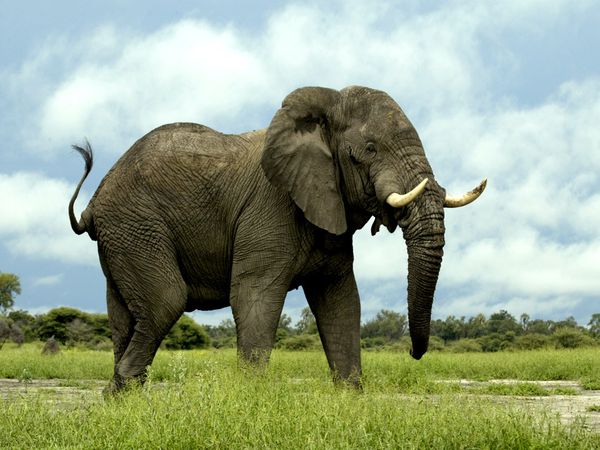Ni igbà kan ri, imú Erin dàbi ti àwọn ẹranko tó kù ni, ṣùgbọ́n Erin fi aigbọ tara ẹni, di o ni imú gigùn. Gbogbo nkan tó nlọ ni ayé àwọn ẹranko yoku ni Erin fẹ tọpinpin rẹ.
Yorùbá ni “Ẹni bá wá iwa-kuwa, ojú rẹ á ri irikuri”. Ni ọjọ́ kan, gẹgẹbi iṣe Erin, ó ri ihò dúdú kan, ó ti imú bọ lati tọpinpin lai mọ pe ibẹ̀ ni Òjòlá (Ejò nla ti o ngbe ẹranko tàbi enia mi) fi ṣe ibùgbé. Bi o ti gbé imú si inú ihò yi ni Òjòlá fa ni imú lati gbe mì. Erin pariwo lati tú ara rẹ̀ silẹ̀ ṣùgbọ́n Òjòlá kò tu imú rẹ silẹ̀. Ìyàwó Erin gbọ́ igbe ọkọ rẹ, o fa ni irù lati gbiyànjú ki ó tú ọkọ rẹ silẹ̀. Bi àwọn mejeeji ti ṣe ́gbìyànjú tó, ni imú Erin bẹ̀rẹ̀ si gùn si titi o fi já mọ́ Òjòlá lẹ́nu.
Imú gigùn yi dá itiju fún Erin, ó fi ara pamọ́ titi, ṣùgbọ́n nigbati àwọn ẹranko ti ó kù ri imú rẹ gigun wọn bẹ̀rẹ̀ si ṣe ilara irú imú bẹ. Èébú dọlá, ohun itiju di ohun ilara.
Ọ̀bọ jẹ ẹranko ti ó féràn àti ma ṣe àfarawé gbogbo ẹranko yoku. Ni ọjọ́ kan, Ọ̀bọ lọ si ibi ihò dúdú ti Erin lọ lati ṣe ohun ti Erin ṣe. Yorùbá ni “Ohun ojú wa, lojú nri”. Bi ó ti gbé imú si inú ihò dúdú yi ni Òjòlá gbe mi, ó si kú. Àwọn ẹranko tó kù fi ti Ọ̀bọ kọ́gbọ́n, nitori eyi ni o fi jẹ imú Erin nikan ló gùn ni gbogbo ẹranko.
Ẹkọ pataki ninu itàn yi ni pe “àfarawé” lè fa àkóbá bi: ikú òjijì, àdánù owó àti ara, ẹ̀wọ̀n àti bẹ̃bẹ̃ lọ.
ENGLISH TRANSLATION
A long time ago, the Elephant’s nose was just normal like that of other animals, but the Elephant for not minding his business became a long nose/hand animal. The Elephant is always prying at all other animals’ matters.
Yoruba said “Whoever pry unnecessarily, will witness an offensive sight”. As usual, one day, the Elephant saw a dark hole, then poked his nose into it without realizing that it was the Python’s abode (Python is a very big snake that swallows animal and human being as meal). As he poked his nose into the dark hole, it was seized by the Python in an attempt to swallow him. The Elephant cried out in pain but the Python would not release his nose. The Elephant’s wife was attracted by her husband’s cry, then she rushed out to help, so in order to free him from the entrapment, she began to pull him by the tail. As they were both struggling to free the Elephant’s nose from the Python, his nose became longer and longer until it was eventually freed.
The Elephant was so ashamed that he went into hiding, but when the other animals’ saw his long nose that has now become a trunk they became envious. An abuse became a thing of wealth and a thing of shame became a thing of envy.
The Monkey is an animal that loved to imitate other animals. One day, the Monkey in an attempt to imitate the Elephant, went to the same dark hole to poke his nose. Yoruba adage said “What the eye seeks, it gets”, the monkey was immediately seized and swallowed by the Python till he was suffocated to death. Other animals learnt a lesson from the Monkey’s experience, as a result of this, the Elephant became the only animal with a trunk.
The most important lesson from this story is that “imitating others” can cause an unforeseen evil or undeserved punishment such as: sudden death, loss of fund and limbs, imprisonment etc.
Originally posted 2015-06-12 09:30:01. Republished by Blog Post Promoter




This story is perfect for the trend of psychodynamics in our self denials. Many Nigerians could not see themselves fulfilled unless, they measured to the level of their neighbors, due to their lack of self actualizing tendencies. (I pass my neighbors mentality). Should we continue to ignore all the wisdom literatures that, sustain the progressive dynamism of the Yoruba people both in philosophy and thought? It may lead to a disaster for the Yorubas, as long as we constantly promote ignoramus. When shall the voice of the wise be heard? May be there is hope now that, there is forum such as “THE YORUBA BLOG”. Merry xmas and prosperous new year.
I сonstantly ѕspent my half an hοur to read this web site’s content daily along with a mug of
coffeе.